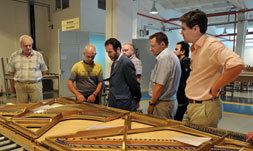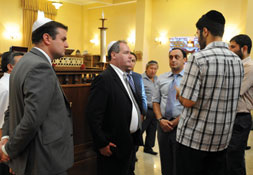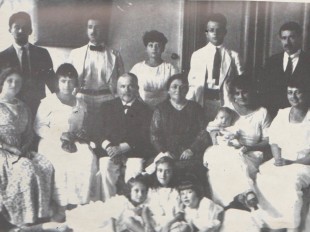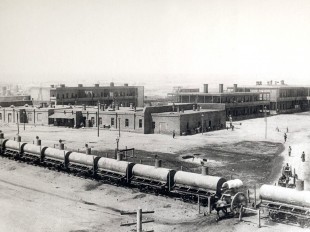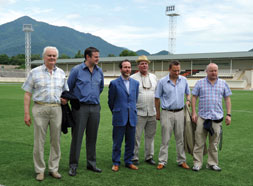 Pages 21-22
Pages 21-22 Six members of the UK’s Azerbaijan All-Party Parliamentary Group (APPG) flew in for an intensive, 3-day visit to the country in mid-July. Over the first two days, they discussed mutual political and economic interests with their counterparts from the Milli Majlis, with Foreign Minister Elmar Mammadyarov and Economic Development Minister Shahin Mustafayev, UK ambassador Peter Bateman, the EU Delegation to Azerbaijan, the OSCE and the State Oil Fund. There was also time for a visit to meet representatives of the Jewish communities in the capital’s new synagogue; the existence of such communities and the harmony of their relations with the rest of the largely Islamic society often come as an encouraging surprise to first-time visitors to the country.
The APPG delegation was led by its Chair, Christopher Pincher MP – here for his third visit – and included Lord Laird and MPs Bob Blackman, Stephen Hepburn, Jason McCartney and Andrew Stephenson.
Following their busy rounds of meetings, on the third day the group headed west out of the capital to Qabala, in the foothills of the Caucasus. Their first port of call was a recently constructed settlement for Internally Displaced People (IDPs) – in this case housing 195 families who had had to flee the Armenian invasion of their homes in Shusha, Kelbajar, Lachin, Aghdam and other regions in and around Nagorno-Karabakh.
The greetings and hospitality were effusive – the APPG group were the first foreign visitors to the settlement - and the pleas were passionate as men and women expressed their bewilderment that the world and its organisations had closed its eyes and ears to the injustice of their predicament. While grateful to the government for its support and their accommodation, their wishes were summarised in one man’s story:
I had to escape in 1992 and I drove here. I have not unpacked my car since then, I believe I will go back to my home. The government cannot do everything, please help us.
Christopher Pincher replied for the visiting group:
Thank you for welcoming us to your temporary home. We recognise the work of the government to help make your stay here as comfortable as possible, but we recognise too that your hearts are where your homes should be and we will convey to Parliament the message about your right to return….
After the obligatory offering of tea, the delegation set off for the village of Nij, where they were met by members of the Udi people, shown around their restored Christian church and listened to a brief résumé of the long and intriguing history of another of the country’s ethnic groups. Again they heard of the closeness of relations between the different religious communities, as well as the fact that the local population of some 3,300 Udis is served by two new schools in which their language is taught.
An open-air, streamside lunch fortified the group for visits to Qabala’s fully-equipped Olympic Sports Centre. Then the Qabala F K ground provided a vision of work in progress towards a footballing future; while a couple of youth teams played out a training game, the foundations of a new stadium were being installed around a lush, newly-laid first team pitch.
The Beltmann piano factory was next on the itinerary and the parliamentarians were taken through the process, from cast steel frame in the workshop to chiming melody in the showroom of glossy uprights and grands, produced by a local workforce of 140.
Finally, production perhaps more predictable for this fertile region was inspected at the city’s immaculate fruit juice factory. No inspection being complete without a test of product quality the guests were then obliged to taste, a task which raised no objections at the end of a busy three-day glimpse into the politics, economics, business and social aspects of life in this part of the South Caucasus. As they left there was talk of debates in Parliament, twinning cities and forums in London. A visit to Azerbaijan always seems to have an impact.
